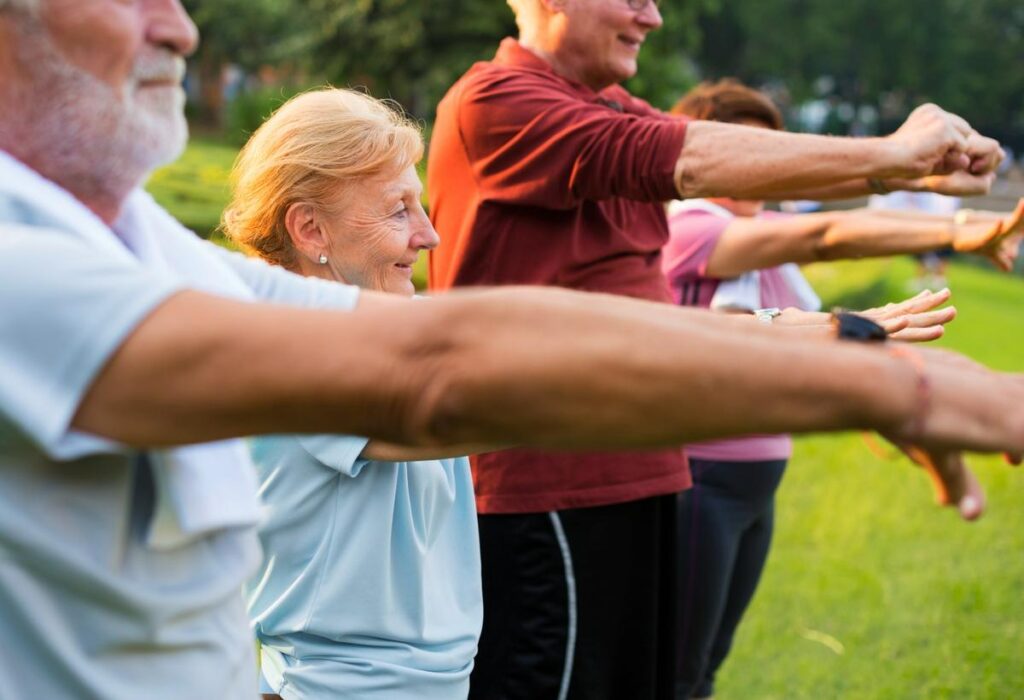Mental health
Home / Mental health
Mental health and exercise
Looking after your mental health is just as important as looking after your body.
Regular exercise can boost your mood, reduce stress and anxiety, and help you feel more in control of your life.
Exercise is one of the simplest ways to support your mental wellbeing every day.
How exercise helps your mental health
Exercise boosts the release of ‘feel-good’ chemicals in the brain, like endorphins and serotonin, which can lift your mood and reduce stress. It also lowers levels of stress hormones, helps you sleep better, and can give you a greater sense of control and achievement.
Over time, being active is linked to lower rates of depression and anxiety. Many people experience stress, anxiety, or low mood at some stage in life. Exercise is not a replacement for professional mental health care, but it is a powerful tool to help you manage mental health symptoms.


Being active can help:
- Lift your mood and reduce anxiety
- Improve sleep and energy
- Boost focus and memory
- Build resilience to everyday stress
Despite these benefits, most adults do not get enough exercise to support their mental and physical health.
Explore key topics

Anxiety
Regular physical activity can help manage anxiety by reducing tension, improving mood, and boosting confidence.

Depression
Exercise can improve symptoms of depression by increasing the production of mood-enhancing chemicals in the brain, improving sleep, and boosting mood.

Stress and mood
Regular exercise improves your ability to fall asleep. Quality sleep helps improve mood, reduce stress, and strengthen overall mental wellbeing.
What type of exercise is best?
It’s not a one size fits all approach – try a variety of different types of activities and choose one that you enjoy the most.
- Thirty minutes brisk walking a few times a week is a good general starting point and can be built on from there.
- Aerobic exercise and lifting weights have been shown to be effective in treating mental conditions like depression.
- You don’t have to join a gym – activities like swimming, walking the dog, jogging while listening to music, bike riding, gardening, bushwalking, and yoga can all be beneficial.
An Accredited Exercise Physiologist can assist you with getting started.
Struggling with your mental health?
If you’re struggling with your mental health, it’s best to firstly seek professional advice by speaking with your GP.
If you have a diagnosed mental health disorder, your doctor can create a plan to treat it.
A mental health treatment plan lets you claim up to 10 individual and 10 group sessions with an eligible mental health professional each calendar year.
The effects of exercise on children's mental health

Improving mental health in kids
Regular physical activity can help manage mental health in kids. Learn more about how it might benefit the young people around you.

Outdoor play for children
Exercise and outdoor play can benefit children’s physical and mental health.
Frequently asked questions
What types of exercises are best for reducing anxiety or depression?
Almost any movement can help. Aerobic activities like walking, jogging, swimming or cycling are proven to reduce symptoms of depression and anxiety. Strength training also improves mood and self-esteem, while mind-body practices like yoga or tai chi can be calming and support stress management. The best exercise is the one you can stick with and enjoy.
How much exercise do I need for mental health benefits?
You don’t need to run a marathon to feel the difference. Research shows that even short bouts of movement, like a brisk 10-minute walk, can improve mood and reduce stress. For longer-term benefits, try to build up to the national guidelines of at least 150 minutes of moderate exercise a week. The key is consistency and finding activities you enjoy.
What if I'm feeling too anxious or low to exercise? How can I start?
It’s common to struggle with motivation when you’re feeling down. Start small: a short walk, gentle stretches, or just a few minutes of movement at home can make a difference. Choose activities that feel manageable and enjoyable rather than overwhelming. Setting realistic goals, exercising with a friend, or seeking support from an exercise professional can also help you get going and keep moving.
How soon will I notice mental health improvements from exercise?
Some benefits happen almost straight away. Many people feel calmer, more energised or in a better mood after a single session of physical activity. For lasting improvements, like reducing symptoms of depression or anxiety, regular activity over several weeks is most effective. Think of exercise as a long-term investment in your mental wellbeing.
You may also like

How Can Exercise Improve Your Mental Health?
October 10th is World Mental Health Day! It’s pretty hard to imagine that there was a time not too long ago when talking openly about mental health could be considered a social faux pas. Thankfully, this is all in the past. This change may have stemmed from a shift in society’s attitudes, with people now […]
4 Ways to Reduce Stress
With our ever-stressed, fast-paced lifestyles, our bodies are pumping out cortisol almost constantly. This can wreak havoc on our health. So, what exactly is cortisol, how does it affect your body and how can you keep it under control? Let’s investigate how to reduce stress… What is cortisol? Cortisol is a glucocorticoid (steroid hormone) that […]

The connection between ageing, mental health and exercise
As we age, we are faced with many new challenges in life (both physical and mental!). Our bodies and minds ageing can lead to an increase in levels of stress and anxiety, which in turn can take a toll not only on our physical health but also our mental health. Some common challenges among older […]
